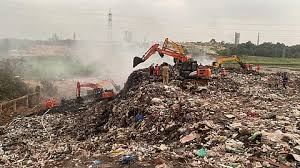Kerala’s Growing Waste Disposal Challenge
Current Affairs NationalPosted by newadmin on 2025-02-26 08:53:18 |
Share: Facebook | Twitter | Whatsapp | Linkedin Visits: 87

Kerala’s waste management practices have come under scrutiny, with reports revealing that the state has been offloading non-biodegradable waste to neighboring states like Tamil Nadu. This method, rather than solving the issue, merely shifts the responsibility elsewhere. The report “Choking on Toxic Smoke – The Brahmapuram Garbage Disaster in Kochi and Municipal Solid Waste Management in Kerala” stresses the need for internal solutions to address the crisis effectively.
Kerala produces around 11,449 tonnes of municipal solid waste daily, collected from six municipal corporations, 87 municipalities, and 941 panchayats. Since 1994, local self-governments have been responsible for managing waste, but many urban bodies struggle to meet the Solid Waste Rules of 2000, which mandate centralized disposal facilities. The waste crisis became particularly evident in March 2023, when a massive fire at the Brahmapuram landfill burned through 800,000 tonnes of legacy waste, releasing toxic pollutants into the environment. Scientific studies confirmed the presence of hazardous substances, raising significant health concerns for local communities.
While some decentralized waste management models, such as those in Alappuzha and Thiruvananthapuram, have shown promise, they face challenges due to inadequate infrastructure, underutilized facilities, and unreliable waste composition data. Audits indicate that urban local bodies have failed to conduct necessary surveys, further hindering effective waste disposal. Plastic pollution remains a pressing issue despite the ban on single-use plastics in 2020. Microplastics are now prevalent in major water bodies, and e-waste management remains lax, with hazardous materials often improperly stored, posing environmental and health risks.
The report calls for Kerala to integrate waste management with broader development policies, including land-use planning, public health, and social justice. Authorities must critically assess high-cost waste-to-energy plants and explore more sustainable alternatives. Some local self-governing institutions have already initiated microenterprise schemes focused on reusing and recycling waste. These efforts not only improve waste management but also generate employment opportunities. The report highlights the need to expand such successful models across the state to ensure long-term sustainability.
Search
Categories
Recent News
- Massive Development Boost for Nellore Rural
- Cheetahs' Homecoming: India's Wildlife Restoration Milestone
- Sonam Wangchuk's Prolonged Detention: A Troubling Injustice
- Hyderabad Fights Back: A City's Cybercrime Awareness Crusade
- Andhra Pradesh's Zonal System: A Hurdle in District Formation
- Hyderabad's Traffic Wings Get a Boost with IPS Officer Reshuffle
- Uncovering the Golden Scheme: I-T Raids Expose Bullion Trading Secrets
- Big Tech's Child Safety Crisis: Australia Sounds the Alarm
Popular News
- Navigating IPO Market Dynamics Amid Volatility and Regulatory Changes
- Massive Worldwide Microsoft Outage Disrupts Multiple Sectors
- Panjapur Bus Stand to Reshape TNSTC Routes
- తెలుగుదేశం పార్టీ - పేదరికాన్ని నిర్మూలించడంలో వాగ్దానం
- Universities Embrace Remote Learning Technologies Amidst Ongoing Pandemic